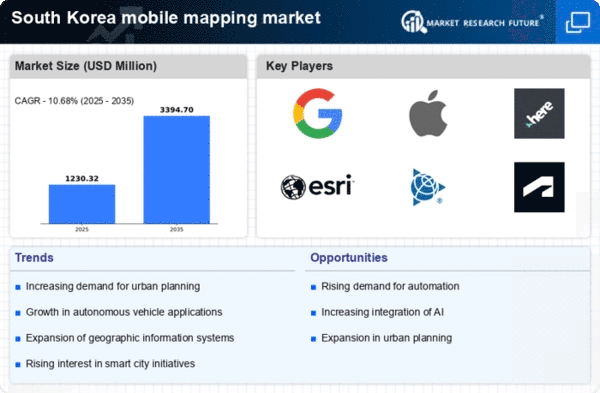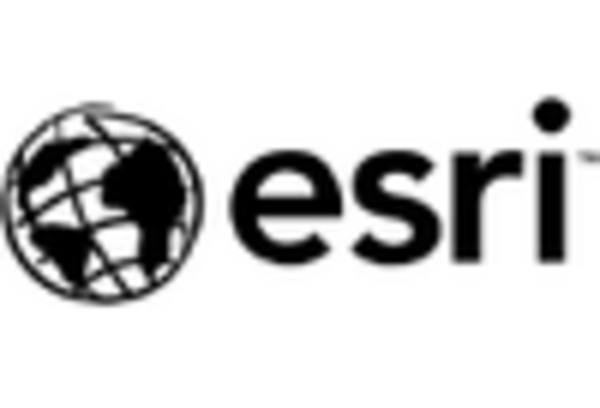Rising Urbanization
The rapid urbanization in South Korea is a pivotal driver for the mobile mapping market. As cities expand, the need for accurate mapping solutions becomes increasingly critical. Urban areas are experiencing a surge in population density, leading to complex infrastructure requirements. This complexity necessitates advanced mapping technologies to facilitate urban planning, traffic management, and public safety. The mobile mapping market is projected to grow as municipalities seek to enhance their geographic information systems (GIS) capabilities. In 2025, the market is expected to witness a growth rate of approximately 15%, driven by the demand for precise and timely data to support urban development initiatives.
Advancements in Sensor Technology
Advancements in sensor technology are propelling the mobile mapping market forward in South Korea. The development of high-resolution cameras, LiDAR systems, and GPS technologies enhances the accuracy and efficiency of mobile mapping solutions. These innovations allow for the collection of detailed spatial data, which is crucial for various applications, including construction, transportation, and environmental monitoring. The mobile mapping market is likely to benefit from these technological improvements, with a projected increase in market size by 20% over the next five years. This growth reflects the increasing reliance on precise mapping data across multiple sectors.
Growing Demand for Autonomous Vehicles
The growing demand for autonomous vehicles in South Korea is a significant driver for the mobile mapping market. As the automotive industry shifts towards automation, the need for accurate and up-to-date mapping data becomes paramount. Mobile mapping technologies provide the necessary spatial information for navigation and obstacle detection in autonomous systems. The South Korean government is actively promoting the development of autonomous vehicles, which is expected to create a substantial market for mobile mapping solutions. By 2025, the market for mobile mapping related to autonomous vehicles could reach $500 million, reflecting the increasing integration of these technologies.
Integration with Smart City Initiatives
The integration of mobile mapping technologies with smart city initiatives in South Korea is significantly influencing the mobile mapping market. As cities aim to become more efficient and sustainable, the demand for real-time data and mapping solutions is escalating. Mobile mapping systems provide essential data for traffic management, environmental monitoring, and urban planning. The South Korean government has allocated substantial funding towards smart city projects, which is likely to bolster the mobile mapping market. By 2025, investments in smart city technologies are anticipated to exceed $1 billion, creating a robust environment for mobile mapping solutions to thrive.
Increased Focus on Infrastructure Development
The increased focus on infrastructure development in South Korea is a crucial driver for the mobile mapping market. With ongoing projects in transportation, utilities, and urban development, there is a heightened demand for accurate mapping solutions to support these initiatives. Mobile mapping technologies facilitate the efficient planning and execution of infrastructure projects by providing detailed spatial data. The South Korean government has committed to investing over $10 billion in infrastructure improvements by 2025, which is likely to stimulate growth in the mobile mapping market. This investment underscores the importance of precise mapping in achieving successful infrastructure outcomes.
















